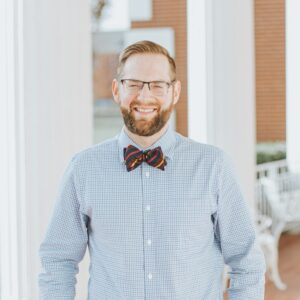
Creaturely Pedagogy Part One: Teaching with Feeling
With almost no leaves in the canopy above us, sunlight flooded the gently sloping hillside, penetrating and illuminating every open space in the leaf litter. My students and I had just spent some time—I don’t know exactly how long—inspecting a Dark Fishing Spider (Dolomedes tenebrosus) who was absorbing the warmth on the smooth gray bark of an American Beech (Fagus grandifolia). The spider—stretched out like a stereotypical beach bum—seemed to be enjoying the early spring warmth as much, if not more, than we were.
“This doesn’t even feel like class,” one of my students exclaimed, taking a seat in the crunchy oak and hickory leaves. Indeed it didn’t. I had hoped for this.
That experience was just one of countless precious memories during my first semester teaching Creaturely Theology in the spring of 2023. That course, an upper-level undergraduate theology elective, weds theological reflection on the more-than-human world, spiritual formation in nature, and biological and ecological surveys of the flora and fauna of Johnson University Tennessee’s campus.[i]
In the fall of 2020, due to COVID risks, I began teaching outside almost exclusively. That experience brought immediate, unexpected pedagogical opportunities.[ii] While I continue to teach my regular courses outside as often as possible, “Creaturely Theology” has drastically enlarged my outdoor classroom. Now my students and I spend every Monday morning in the spring exploring the wild and hidden corners of Johnson University Tennessee’s 400-acre wooded campus. Increasing the physical dimensions of my “outdoor classroom” has required comparable growth in my pedagogical imagination and teaching repertoire.
In this series, Creaturely Pedagogy, I will explore some of the exciting, life-giving lessons I am learning from my students, our non-human neighbors, and from the land itself through Creaturely Theology.
All has not gone smoothly, I confess. The course has attracted significant attention, some of it negative.[iii] One social-media commenter, while generally supportive, called the course “lighter weight.” Every university educator and student has heard of the trope of the “blow off class.” Such courses ostensibly require little work on the part of students. They lack rigor. They are filler. Some even judge them to be a waste of time and resources.
While I succeeded in creating a course that—at least sometimes—did not feel “like class,” it was not because Creaturely Theology wasn’t rigorous or intellectually challenging. I had to modify the schedule because of the density and difficulty of the required readings! The very distinction between serious and unserious courses, though, provides occasion to evaluate the ideals and goals of university education generally, and religious and theological education specifically, in our moment.
In the recent past—with effects still relevant to the present—Western university education has idealized theory, technical content, control, and the abstract. In a word, education and competency have been equated with “mastery.”[iv] But none of the current educational disciplines that exist in university contexts today, not even the so-called “hard sciences,” can deliver mastery over their subject matter. In each there is an almost incomprehensible amount of material to examine, and new developments and discoveries happen all the time, even in the humanities, and, perhaps most shockingly of all, in theology! Education must involve developing competencies to think, speak, and work humbly and responsibly in a complicated world. And the work of coming to think and speak well about God and all things in relationship to God is rather involved work, after all.
As readers of this blog know well, all human knowing is embodied. There is no human learning without sensation, and consciousness never happens untethered to underlying neurology and neurobiology. All learning involves feeling. All loving does, too. Creaturely Theology has allowed me to combine high-level theological reflection with unforgettable, hands-on experiences in the more-than-human world.
In my forthcoming blogs in this series, I will often emphasize the importance of sensation and feeling in the work of theological reflection and learning. Future entries will explore the themes of naming, risk and fear, departures and arrivals, and ritual. I hope you’ll follow along.
Notes:
[i] Initial funding for the course came from the Science-Engaged Theology course grant competition in the St. Andrews New Visions in Theological Anthropology project, funded by the John Templeton Foundation.
[ii] In a previous blog series, I shared some of the things that I had been learning from teaching outside.
[iii] See “Johnson University’s New ‘Creaturely Theology’ Course Stirs Controversy.”
[iv] Note Willie James Jennings’ salient critique of “mastery” in After Whiteness: An Education in Belonging (Grand Rapids, MI: Eerdmans, 2020).
Leave a Reply